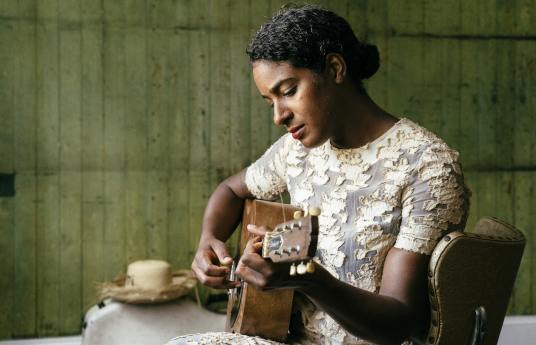|
Leyla McCalla's Vari-Colored Songs, is a rerelease of her first solo album, issued as a limited run in 2013. McCalla’s intention to acquaint listeners with Hughes’ poetry by putting his words to her compositions is laudable. Hughes is a giant among writers, intellectuals and activists, a keystone of the Harlem Renaissance of last century’s 20s and 30s that produced a starburst of intense Black brilliance in music, the fine arts and literature, as well as thought; the Harlem Renaissance also served as a forum to define and legitimize pride in one’s blackness. McCalla, who is of Haitian descent, sets eight of Hughes’ poems to her string band, country, and New Orleans style music, interspersing these curiously with traditional Haitian fare. Two compositions of her own are included, music and lyrics both. All told, it is an idiosyncratic and intriguing collection that yields mixed results.
 The reissue of Vari-Colored Songs is timely for its devotion to Hughes and his deceptively simple, yet profound and beautifully cadenced Afro-centric writing, as a harbinger of Black Lives Matter, and his poems, indeed all of his writings, both personal and emblematic, are a reminder that we are still awaiting a national reckoning on race.
The reissue of Vari-Colored Songs is timely for its devotion to Hughes and his deceptively simple, yet profound and beautifully cadenced Afro-centric writing, as a harbinger of Black Lives Matter, and his poems, indeed all of his writings, both personal and emblematic, are a reminder that we are still awaiting a national reckoning on race.
A multi instrumentalist, McCalla plays the cello and banjo on the album, adding a guitar and some percussion along the way. The songs follow the travels of the banjo after it left West Africa for the Middle Passage, made landing in the Caribbean, lingering in Haiti, then continued on, grazing New Orleans and up the Mississippi to nourish the slave colonies along its banks before reaching white Appalachia.
Her banjo style is standard pick and strum, but she has chosen to mostly strum and pluck the cello strings, rather than bow them; this gives a generally flattened, more upright bass-sounding tone to the arrangements. It’s curious this choice of a more plodding sound when the cello produces some of the most haunting and complex tones of any Western instrument. A more measured balance between the two cello techniques would give some of the pieces more verve.
“Girl” is a poem that reaches poignantly out to women. It seems to tell of a woman out of synch with the more staid time she lives in, and is martyred, whether by her hand or others’, for living too freely. “She lived in sinful happiness…” The poem’s intensity is heightened in McCalla’s treatment by the slide guitar, and there’s a lovely brief stretch where she seems to be channelling Bonnie Raitt. Slide guitar aside, one need just listen to the line, “She said my body brings new birth,” and she’s captured a legend. This leads to a burst of energy as McCalla slaps and plucks hard on the cello strings and pushes ahead the tempo, truly engaged.
The Haitian tune, “Rose Marie,” is peppy. It’s the brightest one on the album, and even gets my toes to tapping while the Kreyol lyrics shower accolades upon a woman, Rose Marie, who has taken to care for an orphaned boy. McCalla shadows her own voice electronically and the cello, played like a bass but with gusto, is enlivening.
Another traditional Haitian song, “Mesi Bondye” (Thank You, Good Lord), celebrates God’s saving the Haitian people from misery. This popular tune lags a bit due to repetitive dullish chords on the banjo. The song doesn’t successfully capture the spirit of earlier rootsy and spontaneous interpretations, nor does it have the polished intensity of still others, like that of Harry Belafonte or Susana Baca.

|
|
“Heart of Gold” is Hughes’ ironic lament of a Black Southerner scrambling for a way out of his dehumanization: “I wonder why it’s yes to me, And yes sir to you,” in which a heart (of gold) becomes a commodity to be traded for passage out of and away from misery. Hughes’ lyrics are sui generis, deceptively simple, and referential to his own as well as his peoples’ history, yet we understand the universal dilemma: do we sell our humanity in order to to buy comfort and what we understand is freedom? “If I had a heart of gold…. I’d up and sell my heart of gold, And head north with the dough.” The poem’s affect is clouded somewhat by an overlong strummed cello introduction, but is awakened when McCalla finds her bow and melody, pairing them with her gently winding slide guitar.
In purveying the recognition and appreciation of one of the US’s iconic and essential men of letters, Vari-colored Songs has the potential to deliver a still vital message about suffering, racism’s toll on both personal and societal advancement, and the potential to overcome, but the album comes up somewhat short for lack of ambitious playing and arranging and of coherence. While reference to McCalla’s personal story via the Haitian tunes is charming, they end up as a detour from the message at hand rather than material worthy of its own compilation.
Find the artist online
Further reading:
Leyla McCalla: The Capitalist Blues
Omar Sosa: Across the Divide: A Tale of Rhythm and Ancestry
Giddens, Kiah, McCalla, and Russell: Songs of Our Native Daughters
Photos:
Langston Hughes by Rowland Scherman
Leyla McCalla by Rush Jagoe
|
